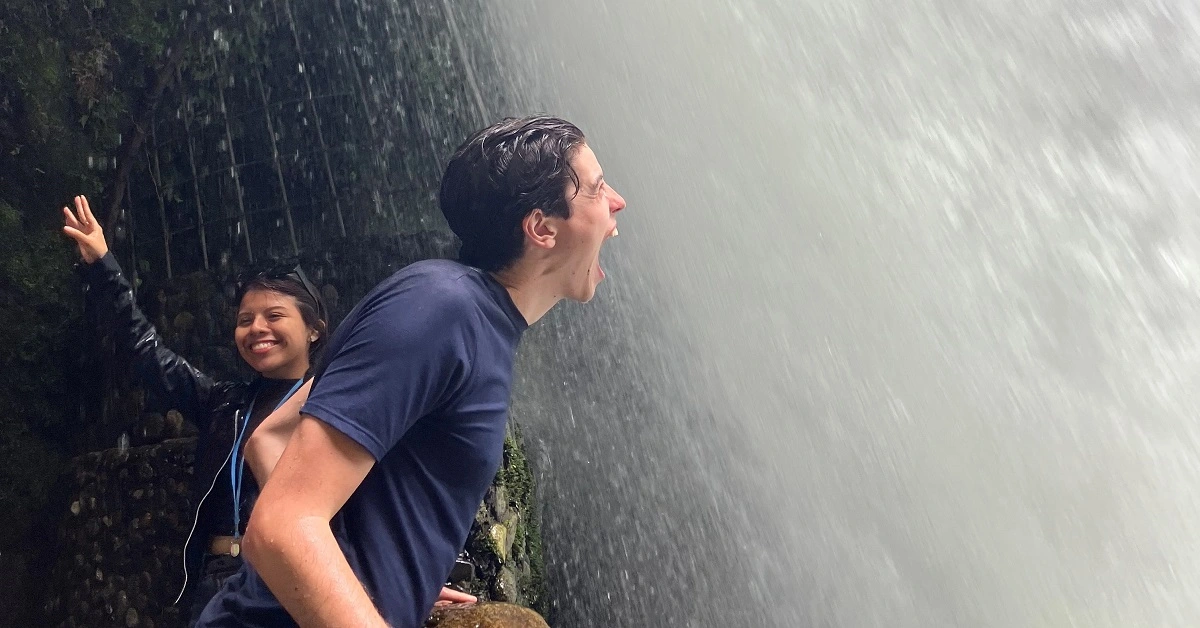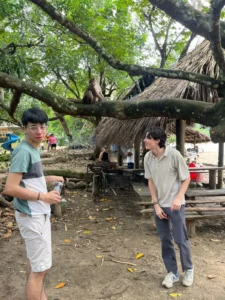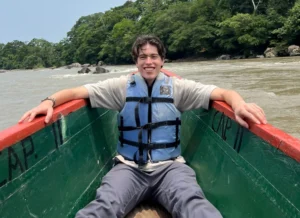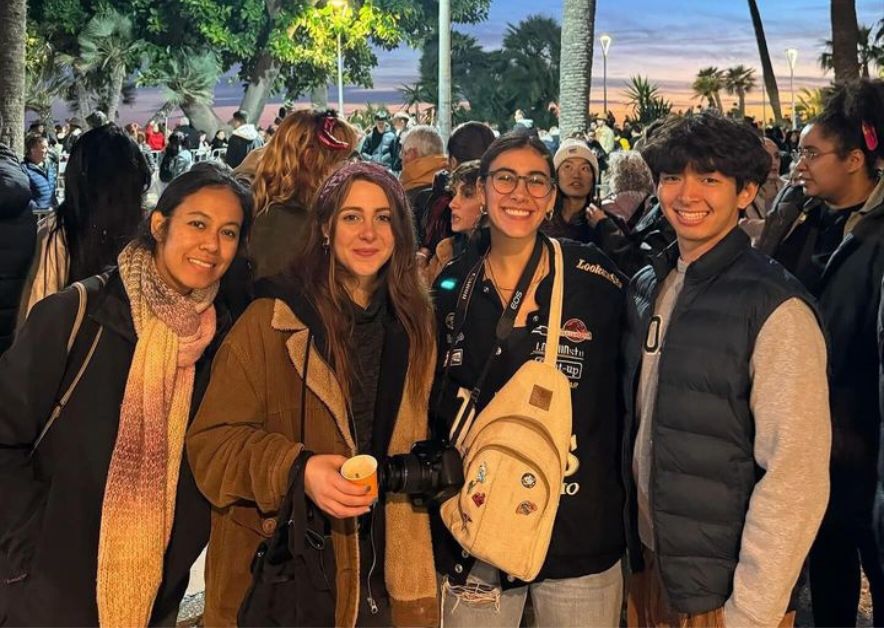3 Reasons Students Should Intern Abroad
The Challenges of Interning Abroad (And Why It’s Worth It) Part 1

Cody T. participated in an Information Technology Internship in Quito, Ecuador during the Spring of 2024. In this blog one of our past candidates explains about his challenges of interning abroad in Ecuador. He goes into detail of interning in a location where there is a language barrier, the company work culture, culture shock, and living with a host family. Read Cody’s difficulties and his perspective on the challenges of interning abroad in Ecuador.
Greetings
“Buenos Dias” is how I begin most of my days, first in my apartment it is a sleepy-eyed greeting in passing, sometimes accompanied by a yawn. Then it is what I tell the doorman of my office building, often quickly followed by a greeting to a coworker waiting for the elevator. Next, it is the doorman of the office. One thing to know about Ecuador is that it is full of doormen, and though the country has been in the news lately for its safety concerns, I have often joked that as long as you’re near an entrance you are safer than anywhere in the United States. Following the doormen is every single other coworker I see on the way to my desk. It is customary in Ecuador, as with many Latin American countries, to greet everyone when you enter a room, no matter the size. Although I am generally extroverted, this habit still took some getting used to.
After many morning greetings and the building of relationships between my coworkers, this routine became something that I looked forward to every day. I now understand that it is a reflection of the community-oriented nature of Ecuadorian culture that finds importance in acknowledging and welcoming every individual to a space. Further, this routine, as only one example of the many community-minded practices of Ecuador, has served as a reminder that the work that I do and the actions I take, both in and out of the office, affect the people and environment around me.

"I Made a Mistake"
Me Equivoqué, I forgot to introduce myself, how un-Ecuadorian of me. My name is Cody Trinkaus and I am a third-year Human Centered Design and Engineering student with a passion for the ethical, equal, and transparent implementation of information technology and the use of qualitative research, quantitative research, and design thinking to inform the creation of usable and socially responsible technology.
I chose to intern abroad to expand my cultural knowledge to enrich the rest of my time in university, gain real, applicable skills to make me competitive in the internship field in the United States, and give myself a change of pace from my usual course load and quiet comfortable corner of the US. Motivated by my love of nature and the mountains, I chose to spend four months interning in Quito, Ecuador in the IT department of a government agency. In this blog, I hope to give you a window into the day-to-day challenges I faced interning in Ecuador. I have also written a part two to this article about the advantages and cool parts of interning abroad. You can check that out here.
Learning How To Make Mistakes
Errores, along with greetings, one of the first things I learned was how to make mistakes. As I said above, me equivoqué, along with a whole array of ways to express that I didn’t understand or had made a mistake became quickly integrated into my vocabulary. The mental tax of this constant confusion should not be understated – it is hard, but that challenge is one of the most important and quickest-felt building blocks to a fulfilling and growth-inducing experience. It also gets better.
As time went on and I built an understanding with my coworkers I began to commit fewer errors and feel less bad about the ones that did slip through. However, the takeaway from this is not that fewer errors will eventually be committed, it is that nowhere else in my life had I faced so much confusion or made so many mistakes and in being faced with that challenge I was forced to learn how to retain self-confidence, resilience, and a good attitude in the face of my own mistakes.
Cultural Differences
Las Diferencias Culturales en los Lugares de Trabajo. Cultural differences and culture shock are two things to be counted on when abroad, no matter where you go. Entire articles could and have been written about Ecuadorian culture, and I recommend doing ample research before arriving in a new country. What I will be focusing on in this section does not define all Ecuadorian culture or workplaces, but instead focuses on the specific experience that I had in my internship. Like I mentioned before, the custom of greetings in the office was very strong and this was a reflection of a larger culture of closeness and banter between coworkers. Jokes come as a highly regarded form of communication and often are of a teasing or hidden vulgarity (double meanings) nature. This kind of joking, or as some of my coworkers called it “bullying”, is especially common among men and tends to lean on gendered stereotypes, such as women being less funny, complaining, or ruining the fun.
As a result, I would not describe the workplace that I was a part of as “safe” in the way that many US workplaces strive to be. I often felt like I was living in a scene from The Office where different men in power were cosplaying as Michael Scott. This culture was generally perpetuated by a group of higher-ranking men who had a “boys club” that met every morning for breakfast and pushed the idea that they were an exclusive group that you should want to be a part of. As an international intern, I was magnet for attention and curiosity and as a result, I found myself in many situations where I felt like I was being tested out by this group, generally involving light-hearted teasing and reminiscing on how much fun they all have in the office.
A note on Ecuadorian humor in general: In my experience what is most likely to get a laugh is a good dig or a well-placed slur or sex joke, and no PCness is a thing above the age of 25. Learning to laugh a long was very important to me, as was learning to justify my thoughts about their actions while also acknowledging the vast cultural difference and context that informs this behavior. In my time in Ecuador, I never felt fully at ease with the humor or behavior of my male coworkers and found much more enjoyment with my younger, college-aged friends who were hilarious and retained vulgarity in a less tone-deaf way.
A final note for any other LGBTQ+ people looking to go to Ecuador, the use of the f-slur is very common, especially among millennials and up when referencing each other and it is worth doing some mental preparation for that. All that said, I was able to find a thriving LGBTQ+ community in Quito and still be respected by and have fun with straight friends despite their use of the word.

Friendships
Amistades, I spent the first month of my internship going back home to my host family for lunch because it was offered, seemed more convenient, and in hindsight more comfortable. Loneliness was a consistent challenge for me throughout the course of my internship. If I didn’t know how to be alone before, I definitely do now. This feeling was not isolated to my personal life and has proved to be challenging in a work environment as well. At time it made me feel unmotivated and even caused me to dread going to work. The need for fulfilling relationships in the places where we spend our time is a real one that interning abroad has put in big red block letters for me. After my first month, I took a stalk of how I was doing and found that I severely lacked the feeling of belonging in my office. This was partially because of the aforementioned cultural differences in the workplace environment, but it was also because I had spent none of my free time with the people whom I worked with, causing me to feel as though I had blended into the background of my workplace.
I chose to make a change to try and improve my quality of life and spent my lunches in the office. At first, I bounced around groups of people not feeling like I had a place yet. Though these were not always the most comfortable lunches, they gave me the names of many of my coworkers and enough of a shared experience to have meaningful passing interactions. Trying out different groups also hooked me up with some incredible traditional lunches, which were delivered to the office for only $2.50 and included an entrée, salad, dessert, beverage, and some delicious salsa! Eventually, after enough whimsical bouncing around, I took a risk and asked the group of people that I was most interested in eating with when and where they took their lunch. Luckily for me, my hunch was right, and this group was more my speed.
It was incredible how difficult the action of asking someone where they eat when it is in a different language in a new country. The challenge of forming friendships in another language is immense and intentional effort is absolutely necessary to form a sense of belonging.

Conclusion
Though this article was focused on the challenges of my internship, I want to highlight the fact that I had an amazing and fun time in Ecuador. These challenges are not a bad thing and have prompted immense personal growth. I hope that you, the reader of this, can take my experience into consideration when thinking about how best to prepare for the incredible journey of working in a foreign country. If you would like to read about the positives, take a look at this article.






